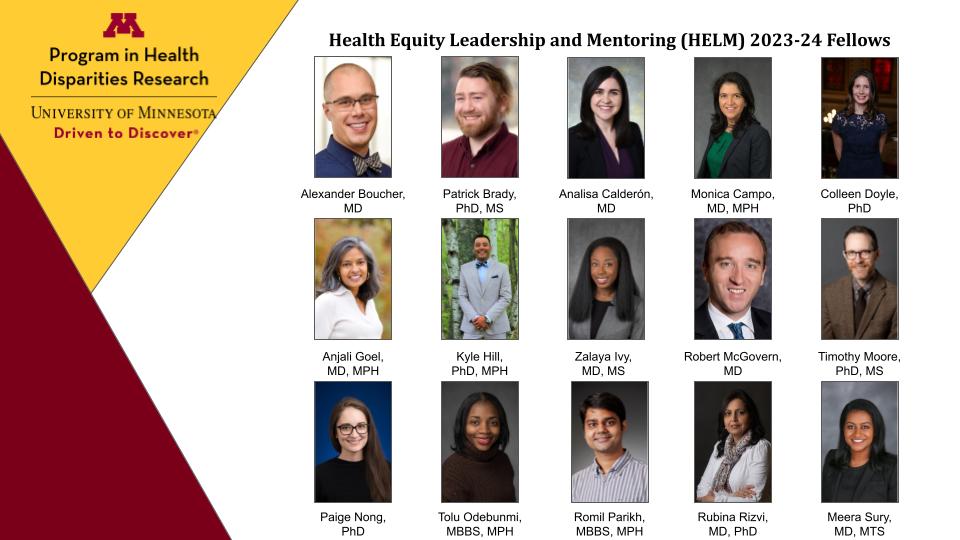Health Equity Leadership & Mentoring Program
Mission Statement
To enhance the academic excellence and leadership capacity of diverse faculty and health disparities researchers at the University of Minnesota to reduce health inequities
Welcome our 2023-2024 Fellows!
We are extremely excited to welcome our 2023-2024 Fellows!

Our Fellows
Program Components
- Seminar Series Sessions: Fellows who are accepted into the program attend monthly seminar series sessions. In addition to traditional academic career development topics, seminars will cover critical topics in health equity research and leadership, i.e. cultural resonance and diversity, micro-aggressions and historical trauma, and the continuing impact of institutional racism on professional development in the 21st century.
- Mentoring: Fellows are matched with a senior level faculty mentor. Mentors in the program offer training on cultural diversity with proven methods to enhance mentoring effectiveness. Current mentor/mentee dyads can be considered for the program.
Who Should Apply?
With the start of a new semester the application window for this year's HELM program is now closed. We eagerly anticipate your applications next year! Check back here next summer for more information.
The HELM program is designed specifically for UMN faculty and post-doctoral trainees who self-identify as a member of a community impacted by health inequities* and/or whose research addresses health disparities.
*Examples include, but not limited to: BIPOC, LGBTQ, people with disabilities, first-generation, rural, low SES, etc...
Benefits
- Receive $250 in career development funds
- Mileage reimbursement for attending HELM seminars and events
- Opportunities to meet with local and national leaders on topics of leadership development and health equity issues
- Priority consideration for local and national professional development opportunities
- Develop a professional network with other health equity scholars
- Obtain a plaque upon successful completion of the program
Expectations
Expectations for HELM Fellows include:
- Attend the kickoff seminar - Friday, September 22, 2023 11am - 4pm CT, in person.
- Attend the closing seminar - Friday, May 17, 2024 11am - 4pm CT, in person.
- The seminar series is held on the 3rd Friday of each month (October 2023 - April 2024) from 11:00 am - 1:00 pm*
- Must be able to attend 9 seminar series sessions
- Must be able to attend at least 7 of the 9 scheduled seminars, with priority given to those who commit to attending all sessions. Seminar dates and format are noted below.
- Seminar dates:
- Oct. 20, 2023 - Virtual
- Nov. 17, 2023 - In Person
- Dec. 15, 2023 - In Person
- Jan. 19, 2024 - Virtual
- Feb. 16, 2024 - Virtual
- Mar. 15, 2024 - In Person
- Apr. 19, 2024 - In Person
- Must be able to attend 9 seminar series sessions
- Meet at least three times with your assigned HELM mentor over the course of the program
- Complete an individual development plan, which includes a self-assessment, short and long-term goal setting, etc. that will be reviewed at each mentor meeting
- Participate in the mentor/fellow matching process, which may include short introductory meetings with potential mentors
- Complete program evaluations
- Provide post-program updates to program staff
Words from our Fellows:
"I appreciated that every speaker took the time to affirm that our sessions were a safe space for discussion and learning."
"I liked when facilitators normalized feelings as junior faculty working toward health equity and when they gave opportunities for everyone to share."